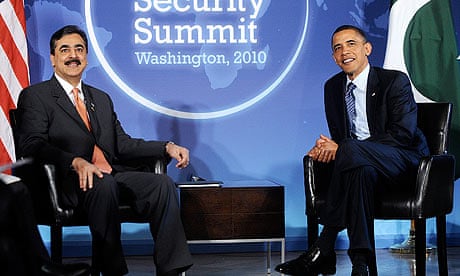The legal dam that has held back the nuclear floodwaters for 40 years is cracking. With 189 member countries, the nuclear non-proliferation treaty (NPT) is the sole global legal and diplomatic barrier to the spread of nuclear weapons.
But the threat of new nuclear-armed countries, the slow pace of reduction of existing nuclear arsenals and the spectre of nuclear terrorism have shaken confidence in the regime. If it collapses, we could witness a cascade of proliferation. The treaty's central bargain is simple: countries without nuclear weapons commit themselves to never getting them, and those with nuclear weapons commit themselves to getting rid of them. It is perhaps the most successful security pact in history.
When the treaty was first negotiated, five nations had nuclear weapons – the US, the Soviet Union, Britain, France and China – and experts feared that the list would soon grow to dozens. John F Kennedy told the UN in 1963: "I ask you to stop and think for a moment what it would mean to have nuclear weapons in so many hands, in the hands of countries large and small, stable and unstable, responsible and irresponsible, scattered throughout the world. There would be no rest for anyone then, no stability, no real security, and no chance of effective disarmament."
The treaty regime stifled this threat by creating an international standard against their spread, changing nuclear weapons from a source of national pride to an object of international censure. It established the inspection regime that helps to prevent the diversion of civilian nuclear technology to weapons programmes. It encouraged Sweden, West Germany, Japan, Australia and other nations considering nuclear programmes in the 1960s to abandon them and join the treaty.
Later, it provided the diplomatic framework that allowed Ukraine, Belarus and Kazakhstan to give up the thousands of nuclear weapons they inherited from the former Soviet Union and to join the treaty as non-nuclear nations. It prompted South Africa, Argentina and Brazil to abandon their nuclear programmes as well. Iraq and Libya are the most recent states to end their nuclear programmes and join.
Today, four other countries have nuclear weapons and remain outside the treaty: India, Pakistan, Israel and North Korea. Iran is currently testing the limits of the treaty with its suspected nuclear ambitions.
The regime suffered eight years of neglect under the Bush administration, which did not even feign interest in disarmament. When Barack Obama assumed office the US arms control infrastructure and global support for the regime were abysmally low and global threats were increasing – including North Korea, Iran and the prospect of nuclear terrorism.
There is no realistic way to contain or roll back these threats without strong international partnership and joint action. But such co-operative efforts require confidence in one's partners, and the US held the confidence of precious few states.
Obama's "nuclear spring" – a treaty with Russia, a new nuclear policy for the US and a security summit that united 47 countries in preventing nuclear terrorism – has restored that faith. Will this convince other countries to enforce the rules against Iran and any other country that cheats on its treaty obligations?
It will be tough, but Obama appears confident. As he said in Prague last month: "We must be as persistent and passionate in our pursuit of progress as any who would stand in our way." By the end of the May conference we will know if that confidence is justified.
